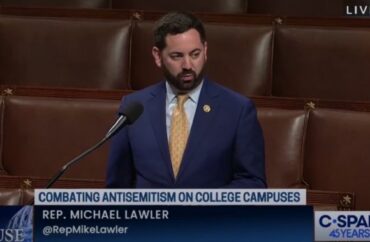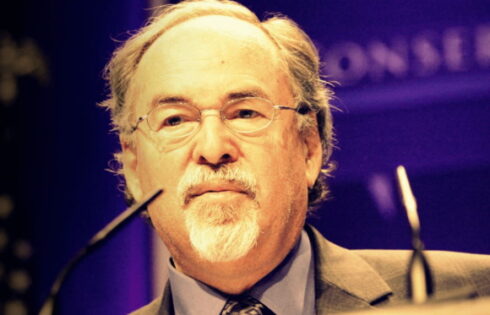
UPDATED
Free speech groups condemn antisemitism, but say bill is too broad
Pending federal legislation to expand the definition of antisemitism as it applies to universities does not infringe on free speech, according to its sponsor.
Republican Representative Mike Lawler’s office referred The College Fix to three articles in response to questions about the Antisemitism Awareness Act and its effects on free speech.
The bill would use a “definition of antisemitism set forth by the International Holocaust Remembrance Alliance for the enforcement of Federal antidiscrimination laws concerning education programs or activities, and for other purposes,” according to the legislation.
That definition provides examples of antisemitism, including “Using the symbols and images associated with classic antisemitism (e.g., claims of Jews killing Jesus or blood libel) to characterize Israel or Israelis,” and “Drawing comparisons of contemporary Israeli policy to that of the Nazis.”
An unusual mix of politicians have come out against the bill, mainly on free speech grounds. Conservative Georgia Republican Rep. Marjorie Taylor Greene suggested the bill could criminalize Christian speech about the crucifixion of Jesus. Daily Wire commentator Ben Shapiro, who is an Orthodox Jew, also criticized the legislation. Senator Bernie Sanders said it could punish individuals who criticize Israel Prime Minister Benjamin Netanyahu.
The bill is currently pending, but Republican Senators, including Tim Scott, have companion legislation. His office did not respond to a request for comment. His office gave The Fix a contact for media inquiries, but no further responses were received after reaching out to that email address.
Lawler’s office shared three “[f]act checks…which clearly outline there are no threats to free speech and that the bill is designed to enable the Department of Education to properly address antisemitic hate crimes on campus,” in an email to The Fix.
A Politifact article cites different free speech concerns, including from the ACLU, as well as different opinions from legal scholars.
Another article cited a fact check by AFP, quoting Lawler saying the legislation doesn’t criminalize Biblical speech. “What it is saying in using that contemporary example is that these examples may be considered, but that it depends on the context of what is said,” Rep. Lawler said in May. “If you’re calling all Jews Christ-killers, then yes, that is anti-Semitic and everybody understands that. But if you’re referring to the Bible in context, then no, nobody is saying that that is anti-Semitic.”
A third article was from Our Sunday Visitor, a Catholic publication.
It did not include any interviews with legal scholars, but noted President Donald Trump signed an executive order that used the International Holocaust definition.
The drafter of the definition, Kenneth Stern, has previously said he did not want it to be used to suppress speech. He criticized President Trump in 2019 for his executive order and said “Rightwing Jews are weaponizing it.”
Free speech and Christian groups are also concerned about how the bill could be applied.
Alliance Defending Freedom referred The Fix to a comment from its president, Kristen Waggoner.
She called campus antisemitism “repugnant” and said it “should be condemned.”
The antisemitism surfacing on college campuses is repugnant. But while vile speech should be condemned, the First Amendment protects everyone’s speech. The antidote for bad speech is good speech, not government censorship. The antidote for unlawful conduct (i.e., violence and…
— Kristen Waggoner (@KWaggonerADF) May 2, 2024
Still, she opposes the legislation.
“Given the fraught history of laws that call out specific viewpoints for punishment, Congress should act carefully and with due regard for the First Amendment as it grapples with the explosion of antisemitism across our country,” she wrote on X. “That includes ensuring that no law it passes can be used to punish Americans for their constitutionally protected speech.”
Catholic League CEO Bill Donohue said the legislation has the “noble goal of seeking to combat anti-Semitism” but needs to be fixed by removing the current definition.
“The IHRA definition of anti-Semitism focuses heavily on speech. That is dangerous territory,” Donohue told The Fix via a media statement. “By contrast, the wording of the congressional bill concentrates on behavior, namely discrimination. That is on much safer grounds, constitutionally speaking.”
“More important, the bill ends with a reaffirmation of our First Amendment rights, which includes freedom of speech,” Donohue said. “The IHRA document does not reference any protections for speech, and for good reason: its goal is to penalize speech deemed offensive. As such, it is a very un-American approach to this subject.”
Pro-Israel organization Hillel did not respond to two emailed requests for comment in the past month. StandWithUs declined to comment.
PEN America referred The Fix to its prior statement on the bill, which it said could “could harm academic freedom, free speech, and legitimate political speech.”
“Codifying the IHRA definition, which was never intended to be legally binding or otherwise codified into law, is not the right way to attack antisemitic speech and bigotry,” the free speech group stated in May.
“Its vague nature is ill-suited to serve as a legal standard, much less form a basis for punitive action.”
Editor’s note: The spelling of Bill Donohue’s last name has been fixed.
MORE: Penn nixes Israel divestment vote
IMAGE: CSPAN/YouTube
Like The College Fix on Facebook / Follow us on Twitter






Please join the conversation about our stories on Facebook, Twitter, Instagram, Reddit, MeWe, Rumble, Gab, Minds and Gettr.